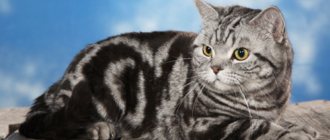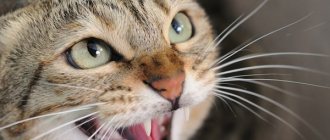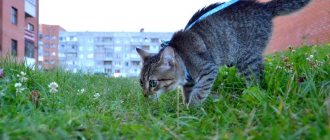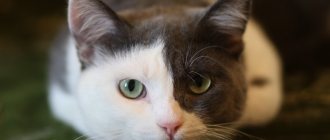What does a cat's meow mean?
Cat meowing
You can often hear complaints that cats annoy their owners by meowing. It turns out that with their sounds they can act on people’s subconscious and thereby achieve what they want. Most often they meow when they are hungry. But it happens that this is how they show their poor health and ask for help.
To prevent the animal from disturbing you with unpleasant sounds, it is necessary to create comfortable conditions for it. Feed him well, show that you care about your pet. Take the cat in your arms, caress it, talk to it. Maybe he just needs attention. If the meowing continues, you should pay attention to his health. Therefore, you should not postpone a visit to the veterinarian.
Bad habits of cats
- home
- Articles
- Publications of specialists
- Animal behavior
- Bad habits of cats
Fortunately, smoking or excessive drinking of beer is not typical of even the most “spoiled”, in the opinion of the owners, of pet furry dogs. Lying on the couch with nothing to do, or immersing yourself in the world of gambling with mice is usually considered as exemplary behavior and does not cause dissatisfaction. And yet there are elements of behavior that are usually called “bad habits.” In this article we will look at them and the main ways to correct problematic behavior. A small survey of clinic patients revealed those bad habits that most annoy owners. So, how can a cat ruin the life of its owners: Scratching and biting arms and legs, climbing up legs like wood
.
As a rule, this problem is associated with insufficient socialization of the kitten at an early age (insufficient amount/absence of positive communication with people in the period from 2 to 7 weeks). It often happens that the owners themselves provoke the kitten into aggressive play (games with hands as a “fighting partner”) and encourage play aggression (with gentle persuasion that “this is not possible, honey,” screams or even punishments, which some cats perceive , like a game). You can read more about play aggression and correction methods in the article Play Aggression in Cats If a kitten climbs up your leg, then, as a rule, it is enough to splash water on it a couple of times so that it stops considering your limb to be an excellent tree. Marks, leaves feces/urine next to the tray, sits in the tray, pees/defecates by, or in the wrong places.
A sudden change in posture or location of urination/defecation may indicate the onset of health problems, or be caused by an unsuitable tray, filler, or inconvenient place for the tray.
If, after reading the article, why the cat stopped going to the litter box the situation remains unclear, it is better to contact a specialist. Scatters the filler.
The habit of “digging up treasure” before or after visiting the toilet refers to natural normal behavior; a cat is a very clean animal and buries feces and urine in the wild too (sometimes the exception is marks that are left in sight to intimidate rivals).
As a rule, for correction it is enough to purchase a tray-house, or a tray with high sides curved inwards, which will prevent the filler from spilling out when “digging up”. Plays with inappropriate objects, “hides” them under furniture, spoils them, tears them
.
Even the most intelligent and intelligent cat is still a naive animal and does not understand much of the difference between a special mouse and the owner’s favorite hairpin made of exactly the same fur. To protect your belongings from home hunters, the best way to hide them is to hide them. As an alternative, you can use strong-smelling aromatic oils (cats especially do not like citrus smells), special repellent sprays or perfumes. “Buries” the bowl after eating
.
This element of behavior is also dictated by the instinct of a predator. Burying the remains of a feast is dictated by necessity - the aroma of leftovers can attract other predators, and they themselves can serve as a source of pathogenic bacteria. If your pet's innate caution bothers you greatly, you can remove the food bowl immediately after the meal and the problem will be solved. In the morning he wakes up with a loud meow.
Meows in the middle of the night, starts playing, running around, making noise at night .
This problem can occur for many reasons. As a rule, this is unconscious encouragement on the part of the owner (feeding the cat that woke up the owner, playing or petting). A cat that is stressed or in pain, or a deaf or deaf cat may also cry suddenly. Cats with a lack of physical activity tend to run around at night, but even here, health problems are possible, for example, itching. Depending on the cause, behavior correction will be different - eliminating reinforcement of unwanted behavior, veterinary care, increasing active games and physical activity. Drinks only from the tap
.
Many cats proudly prefer running water, often because they are also attracted to it as an interesting bubbling toy. You can try offering your cat several drinking bowls in different places in the apartment or a special drinking fountain. Often cats do not want to drink near the place where they eat, and they may look more favorably at the same bowl of water standing on the windowsill in another room. Walks in inappropriate places (kitchen table, sink, windowsill, etc.)
.
The passion for conquering heights is in the blood of cats, however, they, as a rule, climb onto the table, into the sink, onto the windowsill for very specific prey - food, interesting flowers, “toys”. To make these surfaces unattractive to the cat, carefully remove all food so as not to give the cat a “reward” for taking the height of the table. The sink can even be dangerous for the cat, because... Due to an imperfect sense of smell, they may drink water with detergent. To create unpleasant associations in your cat regarding these hot spots, place a light tray on the edge of the table, lined with light, rattling metal dishes so that the cat will jump up and knock it over. This will create in the cat the opinion that it is better not to approach this dangerous place unless absolutely necessary. If you don’t mind, the window sill can be covered with double-sided tape, which most cats don’t like. He begs and steals food from the table and from the stove.
In most cases, this behavior is the result of systematic reinforcement of begging and petty theft on the part of the owners.
If, after looking into these suffering, incredibly hungry eyes, you gave in and gave the cat half of your cutlet, you should know that you gave her the first lesson in manipulating people. After some time, cats understand that the source of all the good things in the kitchen is the table and refrigerator, and the power of expressive eyes can be replaced by the dexterity of their paws. Remove food from the table and stove as soon as you have dined or finished cooking, and place the familiar tray with rattling dishes on the edge of the table/stove. It gnaws and sometimes eats house plants, Christmas tree “rain” and tinsel, threads, small ropes, and dishwashing sponges
.
Unfortunately, this is not only a bad habit and not even a behavioral problem - it is one of the dangers that awaits a cat when kept at home. In addition to the obvious attractiveness of these dangerous toys for a cat, there is an anatomical feature - the papillae on the cat's tongue are directed towards the pharynx, which makes it difficult to spit out the swallowed object. As a result, swallowed objects can lead to serious consequences, including the death of the animal. The best tactic if your cat likes to “play with the vacuum cleaner” is to exclude any possibility of eating dangerous objects - tell all family members that the cat is more valuable to you than the temporary beauty of your home and remove/hide the dangerous objects. He suddenly begins to bite and scratch when he sits on his lap and is petted
.
Some animals may exhibit this behavior. Often in the literature you can find one of the explanations - the cat simultaneously enjoys stroking, and at the same time, the centuries-old experience of generations of cats tells it about the danger. The cat tolerates touch and when it becomes too much of an irritant for it, it abruptly breaks off contact and tries to relieve stress using available methods - it licks itself, runs away nervously, and can bite or scratch the owner. If your pet is prone to this behavior, do not pick him up unless he asks for affection. If you notice increasing tension while stroking, stop stroking and carefully stand up (without removing the cat from your lap with your hands). She will be forced to jump off herself, and the conflict will end before it even begins. Aggressive reaction to other animals, children, elderly people, guests, other animals
.
The aggression that cats can exhibit is as varied in reasons and manifestations as their personalities. The most common causes are cruelty and violence from children and other family members. In relation to other animals, a cat can show aggression associated with status, defense of territory, offspring, and jealousy. If aggression appears to be unmotivated, in your opinion, isolate the cat in a separate room so that it calms down. Do not try to comfort or pet the cat - this will only frighten it more. If the cat behaves calmly, try to behave as if nothing happened. If the problem persists, contact a specialist. Sharpens its claws on furniture, ruins curtains and wallpaper
.
A cat needs to constantly renew its claws to maintain their healthy condition, so as soon as you get a cat, provide it with a good scratching post and spend time teaching the cat to use this “manicure equipment.” Doesn't understand the word "no"
.
You can teach a cat this! When a cat acts undesirably, always say “no” before punishing it (it is advisable to choose the nastiest, harshest, but not loud voice you can imagine). The punishment must be adequate - violence must not be used, otherwise you can easily lose the cat’s trust for a long time. As a rule, in case of unwanted actions, it is enough to sharply hiss at the cat, grabbing it by the withers, or spray water at it from a spray bottle. Cowardice, timidity - hides from loud sounds, music, guests, is frightened by new furniture and other objects
.
Loud sounds and sudden movements, new objects, unfamiliar people for many animals mean danger and cause retaliatory aggression or a desire to hide. It is best not to insist on contact, but to isolate the cat during frightening events. A particularly timid and nervous cat must be handled with care, showing patience and tact - if you achieve obedience with affection and attention, you will gain a true friend, but if you force the cat to be in the company of people or objects that frighten it, you can only achieve even more strong fright. Sleeps in inappropriate places: on a bed, sofa, on removed clothes, ironed linen, laptop, system unit, keyboard, books, shoes, climbs into closets and boxes
. Cats are heat-loving and love comfort, so they prefer warm surfaces and do not understand the protests of owners who do not want the mark of a cat resting on their favorite black trousers. Provide your cat with an alternative - build in all the rooms where you yourself are, a sufficient number of secluded beds for rest and small cardboard boxes with an opening for entry and bedding. To create a pleasant association, place some catnip and/or cat food inside the box. Under no circumstances should you force a cat inside and, moreover, do not disturb it if it is hiding - let it have its own territory where it will be a full-fledged mistress. In fact, most of the above “bad habits” are elements of a cat’s natural behavior and in the wild they are justified, and when kept at home they sometimes help the cat cope with nervous tension that accumulates due to a lack of emotional diversity and physical activity. The main thing to remember when starting to correct problematic behavior is that the cat is not acting out of spite for you and is not trying to take revenge for past grievances, it simply acts as an animal should. Raising a cat is more effective the more peaceful and tolerant the owner is, so remember - everything is in your hands!
November 18, 2010
35490
Health to you and your pets!
© 2020 Team "ZOOVET" We are always happy to help you! 24-hour consultation: +7 Make an appointment [email protected]
Return to list
Why do cats rub their feet?
A cat rubs against its owner's legs
Many people believe that a cat rubbing against its owner's legs means a greeting or a request. In fact, this is how she leaves her scent. By this she tries to show in front of other animals that this person belongs to her pack. On the head of cats, in the temporal part and at the mouth, a specific substance is secreted, with which they mark their person. They also do this in order to feel comfortable and recognize their own and others.
Interesting: How are stones mined? Extraction methods, description, photos and videos
Some cats relieve fatigue from their owner's legs in this way. In this case, friction against the legs occurs when the person is already lying down.
A cat teaches its owner to hunt
Cats that walk outside love to catch mice and birds. They can spend hours tracking down the next “victim”. And often, they bring their prey home, to the feet of the owner. Why? Yes, because cats see that a person has absolutely no hunting instinct. And with such actions, they want to teach the owner to hunt. After all, poor pets take care of their owner and worry that he will never go hungry. And a dead mouse at your feet is lesson number one.
Fluffy cats are so funny that people don’t always understand the meaning of their pet’s behavior. But in vain, cats never do anything for nothing.
What does scratching mean?
Cat Scratching
In general, feline scratching is often regarded as aggressive behavior. But this does not always indicate the bad character of the animal. If the kitten is small, then this is quite acceptable. After all, this is how he understands the world. Yet these “cute creatures” are predators by nature.
But sometimes even adult cats strive to bite or scold their owner. In this case, your pet has a very highly developed hunting instinct . He perceives your moving legs and arms as “prey.” To satisfy the desire of the “hunter”, purchase special toys for him.
Sometimes curtains and furniture suffer from scratching. Cats don't do this out of spite. When scratched on the surface, they remove old nail scales. And they also keep the paw muscles toned. Damaged furniture and curtains are not pampering for them, but a necessity. Therefore, you should think about buying a scratching post.
Harmful cat habits
Not all cat habits are liked by owners; some habits create difficulties for people keeping a pet in an apartment:
Scratching furniture
Sharpening their claws is a natural need, this is how animals remove excess length and clean off the stratum corneum. It is necessary to install a scratching post and teach the cat to use it, strictly preventing attempts to tear up furniture, wallpaper, carpets, and floor coverings.
Tags
Sexually mature cats leave fragrant business cards on the corners of walls, legs of tables, and cabinets. This is how they indicate their right to territory and declare to females that they are ready to mate.
The acrid smell of the secretion is difficult to evaporate, absorbing into the surface. To avoid an unpleasant spirit in the house, to save yourself from unnecessary suffering, and the animal from illness, attempts to break free, it is recommended to castrate the cat. Especially if the owners do not plan to engage in breeding.
Eating out
Cats walking outside on their own can eat offerings from compassionate passers-by and food waste. Stale food causes poisoning, infectious diseases, indigestion, and vomiting. Particularly dangerous are the linings of “cathunters” stuffed with crushed glass and the points of fishing hooks.
Be sure to read:
A cat licks a person’s hands and face: 5 reasons what to do, why a cat constantly licks itself
Utility companies leave out poisonous food to kill rats, but cats can also fall prey to coumarin. It is necessary to feed your pet well before leaving, and it is better to prevent self-walking.
Talkativeness
Intrusive meowing can be irritating for some owners. In this way, the cat signals hunger, fear, anxiety, and pain. Increased talkativeness is unusual for cats; once you figure out the reason, the animal immediately stops talking.
Keeping cats is a fascinating process; intelligent animals adopt the atmosphere of the house and their owners. It's funny to watch them play, fuss with children or other pets, and develop their character as they grow older. Some cat habits have become an inexhaustible source of memes, jokes, and funny videos. Share in the comments which pet habits you like and which you don’t?
Tail movements
Movements of a cat's tail Cats
use their tail to express emotions. If the tail is raised up, about forty-five degrees, and begins to move to the sides, then the animal is in a bad mood. When frightened, the tail is straight and the hair on it stands up.
If the tip begins to tremble, it means the animal is interested in something. And if he is straight and often trembles, this is a manifestation of friendliness.
Interesting: How and what are lollipops made from? Description, photo and video











